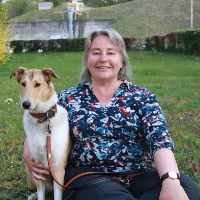
Anna Bogdanova
- Titularprofessorin am Institut für Veterinärphysiologie
- Funktion: Forschungsgruppenleiterin
- Forschungsgebiet: Red blood cell physiology Redox biology
Header

«To boldly go where no man has gone before.»
| 1985 – 1990 | Studies in chemistry (specialization in Radiochemistry) at the Leningrad State University, Leningrad USSR (currently St. Petersburg Russia) |
| 1993 – 1995 | Dissertation at the Humboldt University Berlin, Specialisation: Experimental Biophysics |
| 1997 – 1999 |
Postdoc at the University of Turku, Laboratory of Animal Physiology, Finland. Animal physiology and toxicology |
| 2000 – 2003 | Postdoc at the University of Zurich, Institute of Physiology Medical Faculty, Laboratory of Prof. Ch. Bauer. General Toxicology.Responses of rodent red blood cells and rodent heart to hypoxia and ischemia. |
| 2004 – 2015 | Postdoc at the University of Zurich, Institute of Veterinary Physiology, Laboratory of Prof. M. Gassmann Free radical-based signaling. Inorganic biochemistry. Red blood cell research. |
| 29.09.2016 | Habilitation at the University of Zurich. Specialization: General Physiology |
| 2016 – heute | Titular Professor at the University of Zurich, Institute of Veterinary Physiology |
Wissenschaftliche Arbeit versus andere Berufstätigkeit: Weshalb haben Sie sich für die Wissenschaft entschieden?
I am naturally curious and was exposed to science since I was born. My grandparents were biologists and parents were geologists and chemists. I was considering becoming a sculptor or a vet (after reading James Herriot’s stories) as an alternative.
Was gefällt Ihnen an Ihrer Arbeit und was ist das Besondere dabei?
Science is a planet without borders where freedom is the biggest gift. Being a scientist, one learns to be independent, innovative and creative, but also responsible and precise in working, talking and writing. And one is never ever bored!
Wenn Sie an Ihre Karriere zurückdenken, gab es einen besonders prägenden Erfolg, auf welchen Sie stolz zurückblicken? Was war die grösste Herausforderung Ihrer Laufbahn?
My biggest success was to have the family that has always supported me all the way, traveling with me, taking care of my child, inspiring and joining in what I was up to. The most difficult time there was to leave my child and husband back in Russia, to go to Berlin for my PhD studies. I was so motivated to get the job done asap, that I completed the PhD thesis preparation in less than two years.
Welche Person / welche Institution hat Sie in Ihrem beruflichen Umfeld am stärksten unterstützt?
The first role model for me was my grandfather, a cytologist with vision with whom I spent all my childhood. One more role model was my supervisor during the first Postdoctoral fellowship, Prof. Mikko Nikinmaa at the University of Turku.
Hatten Sie (besondere weibliche) Vorbilder, die Ihren Werdegang beeinflusst haben? Welche?
As many girls, I have chosen to become a radiochemist following the steps of Maria Skłodowska-Curie. The second hero for me was Konrad Lorenz.
Welche Massnahmen ergreifen Sie als Professorin, um den wissenschaftlichen Nachwuchs (insbesondere Frauen) an Ihrem Institut zu fördern?
Our Red Blood Cell Research Group is very young. We are a family-like team that stands for each other in good and bad times. Being lonely is a curse of a scientist. We are sharing fascination for the everyone’s small and not so small discoveries. And we always find the way to move forward and always find some words of support for the family members and team mates.
Welche Tipps geben Sie einer Nachwuchsforscherin mit auf den Weg, die eine akademische Karriere ins Auge fasst?
Being a scientist is a luxury, and it comes at a cost of free time, contacts to other people, own emotional and intellectual resources. Therefore, one has to REALLY love learning new things, independent thinking, dogma braking, routine lab work, defending one’s ideas. If you like it, if you find it worse spending life for – you are welcome to the club.
Ist es aus Ihrer Sicht eine Herausforderung, die Balance zwischen Forschung und der praktischen Arbeit in der Klinik zu halten? Wie gehen Sie damit um?
This is not quite applicable to me. However, I am convinced, that translational research is the most rewarding and motivating application of the knowledge we gain as scientists.
Teaching young researchers and students would be my second, but most essential activity. Scientific theories have a half-life of 3-5 years. Your students will take it over from where you left it.
Wie stellen Sie Ihre persönliche Work-Life-Balance sicher?
Work is my life, it is not clear where to set the borders. It is close to impossible to stop thinking over a problem, even if you are cooking, spending time with your child or dog-walking.
Welchen Tätigkeiten gehen Sie neben der Forschung, Lehre und Arbeit in der Klinik nach, um sich zu erholen und um Inspiration zu schöpfen?
I like reading stories and being a part of adventures myself. I am a passionate dog-owner and like plants. Art is still a part of my soul since my childhood, as well as music.
Prof. Dr. Bogdanova hat ein Kind